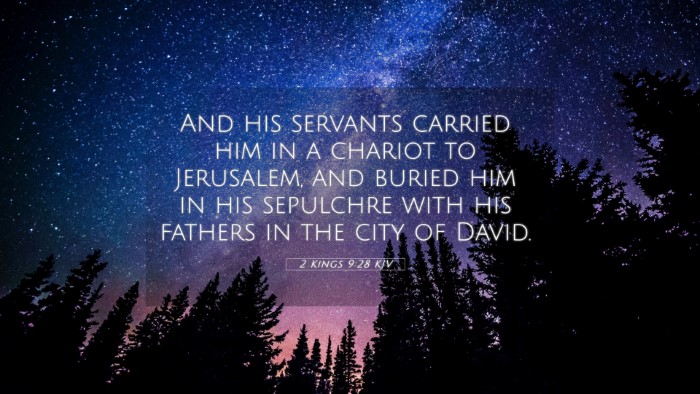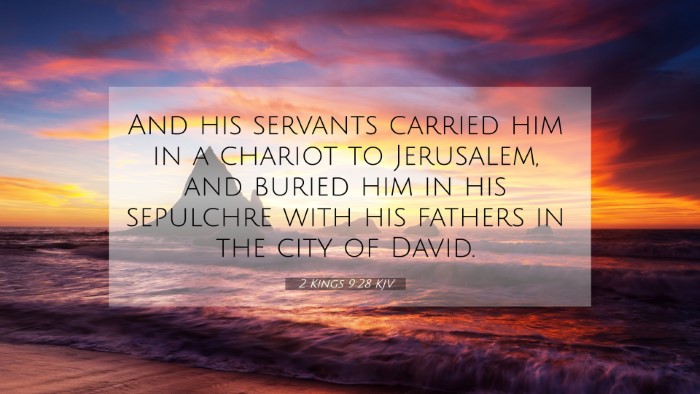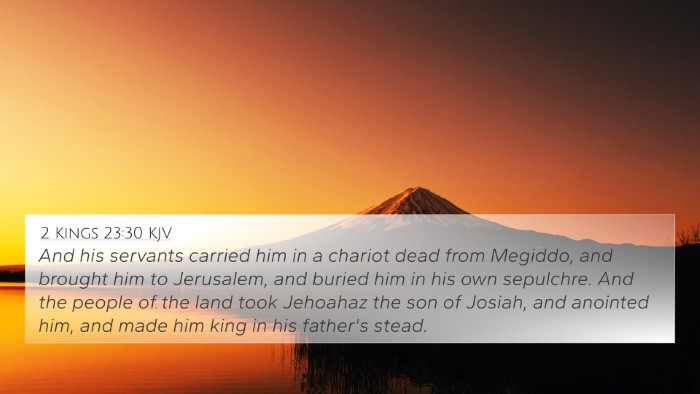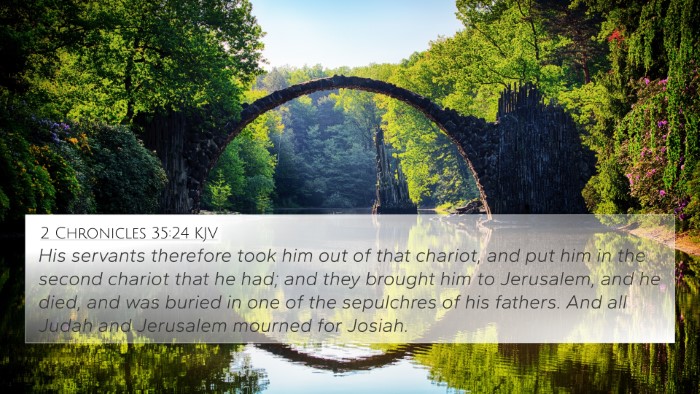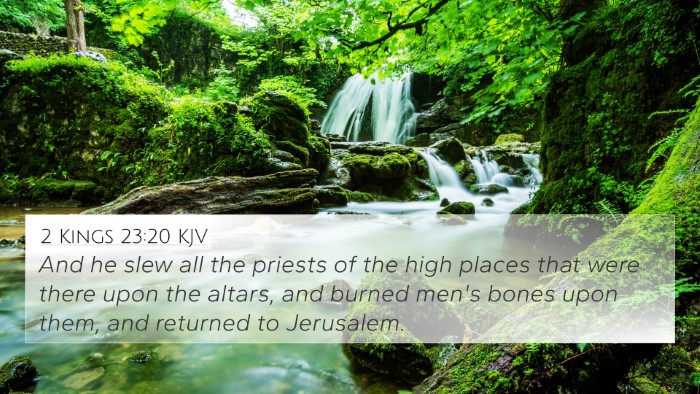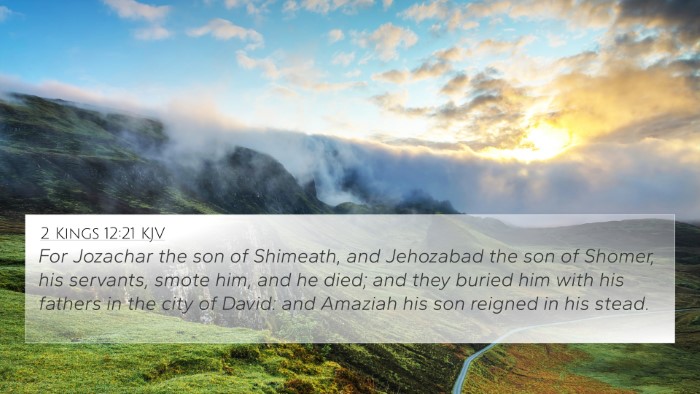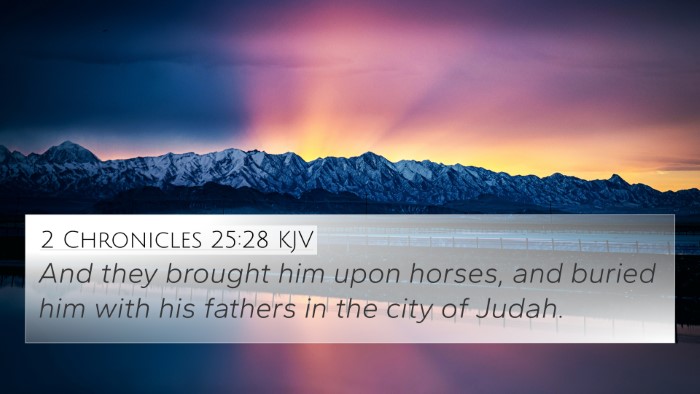Understanding 2 Kings 9:28
Verse Context: 2 Kings 9:28 states, "And his servants carried him in a chariot to Jerusalem, and buried him in his sepulchre with his fathers in the city of David." This passage is part of the narrative surrounding the anointing of Jehu as king of Israel and the judgment executed upon the house of Ahab.
Meaning and Interpretation
The burial of Ahaziah, the king of Judah, in Jerusalem is both significant and symbolic. Below are insights from public domain commentaries that provide deeper understanding:
-
Matthew Henry:
Henry notes that the burial of Ahaziah is an important detail showing the finality of judgment and the transition in leadership. Ahaziah's death signifies the end of his reign, linking to the impending judgment on Ahab’s house.
-
Albert Barnes:
Barnes emphasizes the fulfillment of prophetic signs regarding the houses of Ahab and Ahaziah. His burial in Jerusalem is notable as it connects the two kingdoms and highlights the consequences of sin across generations.
-
Adam Clarke:
Clarke discusses the cultural significance of burial practices during this time, illustrating the importance of honoring a king even in death. He hints at the contrast between Ahaziah’s burial and the fate awaiting other figures condemned in the narrative.
Connections and Cross-References
2 Kings 9:28 can be linked to several other scriptures that illuminate its themes of judgment, leadership, and prophecy. Here are some relevant cross-references:
- 1 Kings 21:19: This verse pronounces judgment upon Ahab, which sets the stage for the events leading to Ahaziah's demise.
- 2 Kings 9:10: This verse reveals the prophecy that dogs will eat Jezebel, linking to the theme of divine judgment that leads to Ahaziah’s fate.
- 2 Chronicles 22:9: Here, the aftermath of Ahaziah's reign is examined, highlighting the unity and downfall of Judah and Israel.
- 2 Kings 9:26: This verse speaks directly about the consequences of Ahab's actions, reiterating the theme of intergenerational judgment.
- Hebrews 9:27: While not a direct cross-reference, this New Testament verse provides commentary on judgment after death, reinforcing the message of accountability in life.
- Jeremiah 22:18-19: This speaks of the fate of Jehoiakim, who faced judgment akin to that of Ahaziah, underlining God's sovereign rule over kings.
- Micah 1:16: This verse, while focused on lament, connects to the mourning for the fallen kings of Israel, reminiscent of Ahaziah's burial.
- Revelation 19:21: This passage illustrates the ultimate judgment of the wicked, tying back to the legacies of sinful kings like Ahab and Ahaziah.
- Ecclesiastes 3:20: Reflects on the shared fate of all, linking to the themes of mortality and accountability in 2 Kings.
- Proverbs 14:32: Mentioning the fate of the wicked, this verse complements the idea of divine justice in Ahaziah's account.
Thematic Insights
This passage from 2 Kings presents several thematic elements that are recurrent throughout the Bible:
- Divine Judgment: The recurring theme of God’s judgment upon leaders, especially in the context of transgression.
- Legacy of Leadership: The impact of one generation's sins on the next, as exhibited in the lineages of Ahab and Ahaziah.
- Historical Significance: The intertwining of political and spiritual narratives within the history of Israel and Judah.
Tools for Cross-Referencing
To study 2 Kings 9:28 more effectively, consider utilizing the following tools:
- Bible concordance to locate key terms and themes.
- Bible cross-reference guide for structured study.
- Online biblical resources that facilitate cross-referencing.
Conclusion
In summary, 2 Kings 9:28 provides significant insights into the consequences of sin, the fulfillment of prophecy, and the inevitability of judgment. By cross-referencing with various scriptures and utilizing biblical resources, readers can deepen their understanding of this verse and its implications within the larger biblical narrative.

